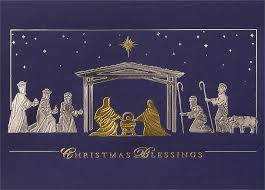 In the past couple of years, at the Family Dollar store in town, the week before Halloween they take the Halloween stuff down and replace it with Christmas stuff. I’ve already had alleged Christmas music— Jesus-free— imposed on me at a store when I went with my mom to pick up her prescriptions.
In the past couple of years, at the Family Dollar store in town, the week before Halloween they take the Halloween stuff down and replace it with Christmas stuff. I’ve already had alleged Christmas music— Jesus-free— imposed on me at a store when I went with my mom to pick up her prescriptions.
I’ve grown up with the fact that retailers are addicted to the Christmas season to make their profit for the year. My father, a Kresge and Kmart store manager, wasn’t around much during December until Christmas morning— he came home late on Christmas eve. At least he was retired by the time Kmart experimented with being open on Christmas day. (Remember, when you choose to shop on Thanksgiving or Christmas day, you are taking away those holidays from the families of employees and management.)
Constant Christmas causes stress, even though sentimental people may love months of Christmas music and Christmas movies on TV. It reminds people that they have to buy gifts and plan parties and events, send out Christmas cards, and so on. And what do retailers now want people to do with all that stress? Buy themselves new TVs, computers, and cars. People can always max out their credit cards and spend the rest of the year paying them off— and paying loads of interest which makes any Christmas ‘deals’ that actually were good deals to no effect.
And in all this retailer-induced madness, what happens if someone mentions the name of Jesus Christ? You’re a party pooper. Or, worse, you are a hater who is bigoted against Jewish people, Muslims and atheists. Which in the minds of the politically correct means you want those people to die and are probably willing to bring that about yourself. Yes, that means when you put up a sign on your lawn that asks ‘Keep Christ in Christmas’ liberals are reading that as ‘I want to be like Hitler’ and they will whine to their friends about all the ‘haters’ in their town.
The church does not teach us to celebrate a Christmas buying fest with months of self-indulgence. The church teaches us to celebrate Christmas eve and Christmas day by going to church and worshiping. Before Christmas, we have the four Sundays of Advent to celebrate. It begins on Dec. 3rd this year.
Advent is not a good church season in which to buy yourself a new smartphone or car, or eat your favorite Christmas candy or cookies every day. Originally Advent was considered a lot like Lent. You made sacrifices as a sign you were sorry about your sins. In the Eastern Church I believe Advent was called ‘Little Lent’. What are YOU giving up for Advent?
Keeping Advent and Christmas in our culture is hard. Your workplace may demand that you participate in ‘Winter Holiday’ parties— Jesus-free Christmas celebrations. If you are a parent who is still letting your kids be raised by wolves— go to public school— they may be assigned to write Jesus-free Santa Claus letters. In our area the schools traditionally send these to the local paper to be printed in a special pre-Christmas edition so all the grandparents in the area can chuckle over all the kids ‘cute’ and usually greedy letters.
Of course the schools will never mention the truth about Santa Claus— that he is a mere nickname for an actual human person, Saint Nicholas, a fourth century bishop (senior pastor) whose feast day is December 6th. That is the traditional day for gifts from Saint Nicholas, usually, in the old days, mostly candy and an orange, which at that time were not everyday fare for kids but a special treat. My mother, born in 1927 to German immigrant parents, remembers celebrating St. Nicholas day, even though they were Protestants. It was a general celebration in Germany.
If you want to celebrate Advent and Christmas in a Christian way, you have to kind of step back from our culture. Stop watching so much secular TV when the rush of Christmas ads begin, even though that is earlier each year. I have a hard time giving up TV because I live alone and putting the TV on makes me feel less lonely. So I start changing the channel to EWTN, a commercial-free Catholic channel, most of the day. I used to sometimes watch the Shepherd’s Chapel channel, which is a commercial-free Protestant Bible study channel, but I don’t agree with all of the theology, especially not now that I’m Catholic, so I don’t watch as much.
If you have kids that are TV or internet addicts it may be next to impossible to get to detach from that bad influence without a major battle. But our culture has gotten so far off the track that people are complaining when someone asks for prayers in the wake of a natural, criminal or terrorist disaster. Because ‘prayers don’t help.’ That’s how the TV and internet are raising your kids. And that’s a year-long problem not just an internet one. But an Advent celebration might be a way to wean your kids away from these bad influences, and, most importantly, towards good ones. Like having days during Advent when the only television watched is EWTN and/or Shepherd’s Chapel.
HINT: in the Catholic celebration of Lent the sacrifices you are making usually have Sundays off, since Sunday is always a day of celebration of the Resurrection of Christ. So if you are avoiding buying and eating Christmas candy or cookies in pre-Advent and early Advent, you can allow yourself a little on the Sundays of Advent to make things more festive.

